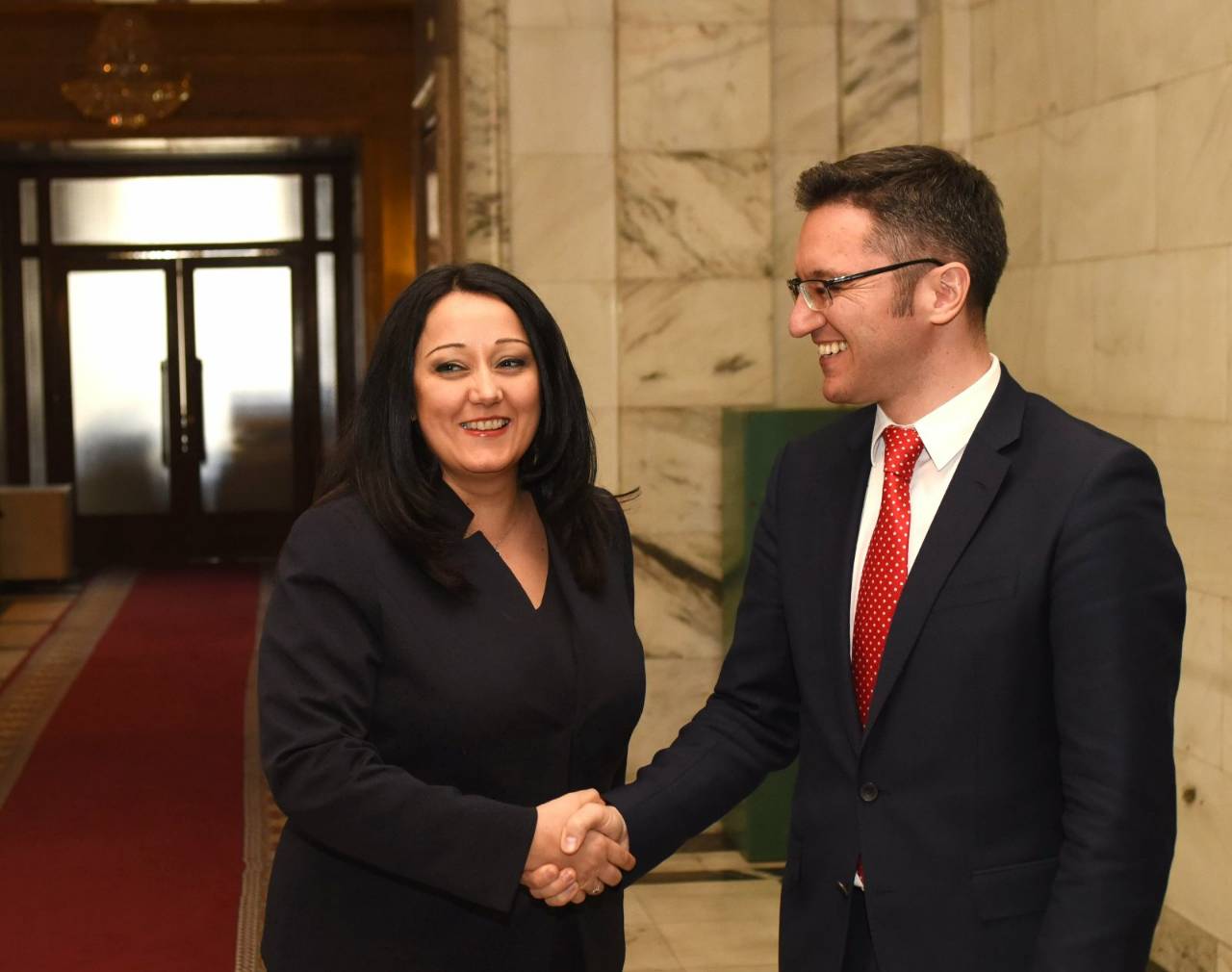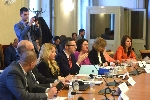News
Minister Lilyana Pavlova appears before the Committee on European Affairs and Oversight of European Funds to report on progress in delivering the priorities of the Bulgarian Presidency of the Council of the EU
29/03/2018

Three months after the beginning of the Bulgarian Presidency of the Council of the EU, Minister Lilyana Pavlova appeared before the Committee on European Affairs and Oversight of European Funds to report on the progress in delivering the priorities of the Presidency.
Minister Pavlova presented to the MPs information about the development of negotiations on individual legislative acts and files, which the team of the Presidency, consisting of almost 1,500 people, had been working on, as well as brief statistics about the popularity and public interest in the events, activities and topics of the Presidency.
She said that until that moment 100 out of 320 events in the calendar had already taken place, with the participation of around 10,000 delegates and guests. According to Minister Pavlova, statistics shows that in the first two months of the Presidency, around 1,600 accredited international journalists from 20 countries, including non-European countries, were involved in covering the events. On the basis of the ongoing media monitoring, the Minister said that until that moment 17,990 articles about the presidency had been published in the Bulgarian and international press, with only 5.6% negative analyses. The largest number of articles are on the Western Balkans.
According to Minister Pavlova, the greatest interest in the Presidency can be seen in Sofia and Brussels, followed by London.
It was mentioned that there was a large percentage of people, predominantly aged 25-34, who followed the topics and events through the dedicated online platforms and social media.
With regard to the work on individual legislative files, Lilyana Pavlova said that in the first three months of the Presidency, there had been 726 meetings of the Council preparatory bodies and the thematic working groups, including 64 trialogues between the Council, the European Parliament and the European Commission on 35 files as part of the meetings of the deputy permanent and the permanent representatives of the member states in Brussels. According to the Minister, the texts on 10 legislative files have been finalised until now, among which the so called geo-blocking regulation, which removes the geographical barriers to e-commerce, the common framework for the provision of better services for skills and qualifications (Europass), the regulation on cross-border parcel delivery services, the package of energy efficiency measures in buildings, and the delivery of the Paris Agreement commitments. Minister Pavlova said that it was expected that by the end of May the trialogues would be completed on another 7 files, one of which being the Posting of Workers Directive, which had been agreed upon at the beginning of March and was considered as a big success for the Presidency.
In the past months, the Bulgarian teams have focused their attention on the status and funding of the European political parties and foundations in connection with the forthcoming European elections, the initiative of the Commission to review the European Citizens’ Initiative Regulation for more effective participation of citizens in the decision making process, the Directive on combatting fraud and counterfeiting electronic payments, the setting up of the European Public Prosecutor’s Office, etc.
With regard to the thematic priorities of the Presidency, the Minister said that the substantive preparation for the EU-Western Balkans Summit had started with the draft of a political declaration with an annex describing concrete strategic infrastructure projects for transport, digital and energy connectivity with hybrid financing. According to Pavlova, this will give a practical dimension to the Union’s political commitment to the European prospect for the region. On the security and stability priority, Lilyana Pavlova said that regarding the reform of the European asylum system, the Presidency had taken up the process to a new stage, having in mind the blocking and the inability of the previous four presidencies to lead member states towards reaching an agreement on relocation and the Dublin regulation. Lilyana Pavlova said that as country holding the presidency, Bulgaria had proposed a new approach and philosophy to the work on the file through a complex crisis management plan. It is expected that by the end of May it will be clear whether a compromise will be reached on the alternative proposal of the Bulgarian Presidency.
Another key topic for the Presidency is the debate on the future of Europe from the perspective of the discussions on the European budget after 2020 and the need for the Cohesion policy to remain a leading European investment policy. According to Minister Pavlova, on the basis of the discussions held so far, including at the ministerial level, many of the member states think that the Cohesion policy should continue, streamlined and with a reduced scope, in view of its significance for the less developed and poorer regions.
Chair of the Committee on European Affairs and Oversight of European Funds Kristian Vigenin recalled that according to the decision of the Bulgarian Parliament from the 1st December 2017, the line ministers were expected to inform the relevant standing committees on the delivery of the priorities within their remit in view of the specificities of the issues as well as accountability and transparency. In this respect, Vigenin said that two meetings of the European Council had been held and that he expected the Bulgarian Prime Minister to inform the National Assembly about the results.
***
The Meetings of the Committee on European Affairs and Oversight of European Funds are open to the public, broadcast live on the website of the National Assembly. A transcript, audio and video recordings are available within a week after the meeting.

Latest news
- 22/04/2021
The Parliament imposed a moratorium on concessions, real estate deals and appointments pending the election of a new cabinet or caretaker government - 16/04/2021
By 156 votes “in favour”, the National Assembly accepted the resignation of the Council of Ministers with Prime Minister Boyko Borisov - 15/04/2021
Speech by Mrs. Iva Miteva upon her election as a President of the 45th National Assembly - 15/04/2021
The Member of Parliament Iva Miteva was elected President of the 45th National Assembly - 15/04/2021
The Members of the 45th National Assembly were officially sworn in - 03/03/2021
The President of the National Assembly Tsveta Karayancheva and MPs attended the solemn fireworks-retreat on the occasion of the Liberation of Bulgaria - 03/03/2021
Every Bulgarian should preserve and honour the memory of those glorious ancestors, thanks to whom Bulgaria exists today, said the President of the National Assembly Tsveta Karayancheva in Gabrovo - 03/03/2021
Today we are on Shipka to pay our respects to all the heroes who sacrificed their lives for freedom, said the President of the National Assembly Tsveta Karayancheva after climbing Shipka Peak together with young people from all over the country - 02/03/2021
The Vice-President of the National Assembly Valeri Simeonov received an award from the Bulgarian Republican Self-Government in Hungary - 26/02/2021
The Parliament adopted at second reading amendments to the Measures Against Money Laundering Act
 Български
Български English
English

